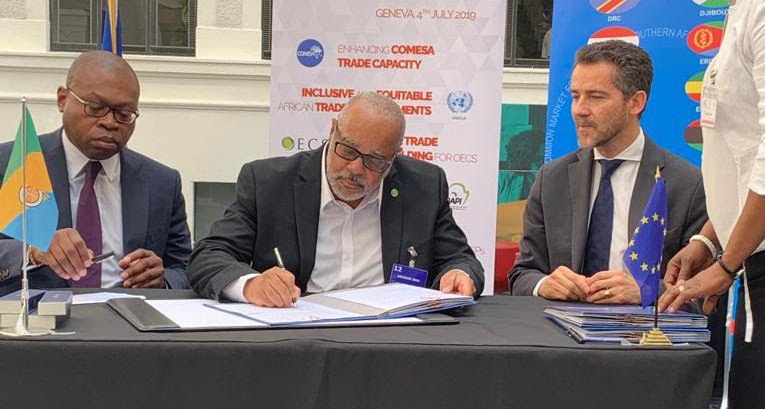Sustainable Trade: OECS signs € 3.6 million project to develop trade capacity in the region
OECS Media Statement
Stronger trade expertise and the creation of a harmonised trade information and facilitation platform in OECS Member States are key areas earmarked for development under the 3.6 million euro, EU/ACP-funded TradeCom II Agreement signed by OECS Director General Dr. Didacus Jules in Geneva, Switzerland today.
The aim of the TradeCom II Programme is to contribute to sustainable economic development and poverty reduction in African, Caribbean and Pacific (ACP) countries through closer regional integration and increased participation in the global economy.
At a signing ceremony held at the World Trade Organisation (WTO) in Geneva, Dr. Jules outlined the importance of the agreement for sustainable trade capacity building in the OECS and the greater integration of Member States into regional and global value chains through stronger trade in goods and services.
"For us this is not a project; it is a significant milestone on a journey that we have embarked upon since the signing of the Revised Treaty of Basseterre in 2010."
"The Treaty provides for the creation of an economic union and enables, among other things, the free movement of people, the free circulation of goods and services and the harmonisation of trade policy."
"This initiative with the European Union (EU) and the ACP will provide much needed support for bringing several already existing initiatives to the next level."
"It will enable the technical and professional upgrading of trade expertise within the OECS Member States and in the Commission. And it will also strengthen capacity for the private sector and cross border traders," Dr. Jules said.
The Director General also highlighted the Programme’s enablement of a robust IT platform that will provide access to real time statistics on intra-OECS and external trade.
“We have already configured and prototyped the agricultural products component of this platform and have been pioneering its use for evidence-based policy and strategic interventions."
"Already, for example, we have been using the data to identify high value, import substitution opportunities for farmers and youth in particular and are aligning these efforts with our healthy lifestyles agenda (grow what we eat; organic food).
Dr. Jules concluded by extending deep appreciation to the EU and the ACP for their support and reiterated the commitment of the OECS to make the TradeCom II Programme a best practice example of how to create lasting impact and sustainable capacity in trade for small island developing states.
About the TradeCom II Programme:
The overall objective of the TradeCom II Programme is to contribute to sustainable economic development and poverty reduction in ACP countries through closer regional integration and increased participation in the global economy.
The Programme’s implementation strategy will facilitate the integration of ACP countries in the global economy and value chains by improving their capacity to formulate and implement suitable trade policies and strengthening their competitiveness. The latter will target support to ACP private sector to diversify their export base, and markets also through greater integration into the regional and global value chains and simplifying, harmonising and regularly updating international compliance procedures including customs procedures. The overall strategy will entail building and strengthening ACP trade capacity at national and regional levels through a combination of TA and capacity building actions.



